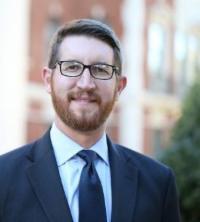“Cultivating Common Ground to End Hunger” with Jeremy K. Everett
Sponsored by AT&T
Thursday, April 28, 2022
11:30 a.m. – 12:30 p.m.
Watch the entire webinar here: https://youtu.be/TKKQ3ZTnKYc
Click here for information about the book Estaba hambriento.
Details about the Hunger Free Community Coalition are available here.
The Hunger Free Coalition Toolkit Jeremy mentions in the session can be found here.
“Blaming the poor for their poverty only adds insult to injury and is largely an inaccurate diagnosis.” (Estaba hambriento, page 7.) Jeremy K. Everett, national hunger expert and author of Estaba hambriento, joins us via Zoom on Thursday, April 28, at 11:30 a.m. to talk about his experiences and how common ground and collaboration is vital to community organizations fighting hunger. “I’ve spent 20 years living and working in impoverished communities,” says Jeremy. “I’ve been an organic farmer, a community organizer, and a social entrepreneur. I’ve driven a school bus to after-school programs and have served on congressional commissions. And at each step, I’ve seen how working together and cultivating trust is the best way to find solutions.” Jeremy is founder and executive director of the Texas Hunger Initiative, an organization that partners with the US Department of Agriculture, state agencies, the corporate sector, and thousands of faith- and community-based organizations to develop and implement strategies to alleviate hunger.

Jeremy K. Everett
In his book, Jeremy writes: “I fundamentally believe we do not see the poor as our equals, as created in the image of God, just as we are. If we did, how could we justify their going without food, clothing, and shelter? If we saw the poor as human, how could we justify the treatment of the immigrant mother separated from her child at the border? How could we justify wage rates that don’t allow someone to buy their own food or medication or to provide for their families, just as we hope to provide for our families?” (Estaba hambriento, page 141.) He points out that people experiencing hunger must make tough decisions and trade-offs every single month. “They are forced to decide whether to pay their rent, their medical bills, their car payment, their child care costs, their electricity bill, or to buy food. Food is often the one negotiable item. If people don’t pay their rent, they are kicked out of their house. If their car payment goes unpaid, their car is repossessed. But if they don’t buy food, they will just be hungry. Yes, not having food leads to less productivity at work and school, increases mental health decline, and causes shame, but they get to keep their home.” (Estaba hambriento, pages 49-50.)
After Jeremy’s presentation, Jeff Quick, Alliance Board Member and CEO of the Food Bank of North Central Arkansas will host a 20-minute Question-and-Answer session. Watch the entire webinar here: https://youtu.be/TKKQ3ZTnKYc
About Jeremy K. Everett: Jeremy K. Everett is the founder and executive director of the Baylor Collaborative on Hunger and Poverty. The Collaborative integrates research and practice through projects such as: the Texas Hunger Initiative, the Research Fellows program, the Global Hunger and Migration project, and the Hunger Data Lab among others. Prior to launching the Collaborative, in 2009 Everett founded and served as the executive director of the Texas Hunger Initiative (THI), a capacity-building, anti-hunger project within Baylor University. THI partners with federal and state agencies, and numerous faith- and community-based organizations to develop and implement strategies to alleviate hunger through research, policy analysis, education, and community organizing. Jeremy earned a bachelor’s degree from Samford University and a Master of Divinity from Baylor University. Jeremy is a Next Generation Fellow of the University of Texas LBJ School’s Strauss Center for International Security and Law, a Senior Fellow with World Hunger Relief, Inc., and was appointed by U.S. Congress to serve on the National Commission on Hunger. Jeremy is the author of I Was Hungry: Cultivating Common Ground to End an American Crisis, a contributing author in Food and Poverty: Food Insecurity and Food Sovereignty Among America’s Poor (Vanderbilt University Press) and The End of Hunger: How Science, Religion, and Politics Can Work Together to Make Possible (InterVarsity Press). Jeremy is married to Amy Miley Everett. They have three sons: Lucas, Sam, and Wyatt
About Jeff Quick: Jeff Quick began his work at the Food Bank of North Central Arkansas as a child while volunteering with his grandmother. As a young adult, Jeff continued to volunteer at the Food Bank by bringing teams of youth and young adults to the organization for summer mission trips. After moving back to Mountain Home in 2007, Jeff began serving on the Food Bank’s Board of Directors. In 2011, Jeff was hired as the organization’s Development Director and was promoted to CEO shortly afterward where he continues his work today. Jeff is a past President of the Arkansas Hunger Relief Alliance, Chairperson of the Mtn. Home Chamber of Commerce Board of Directors, is a Rotarian in Mountain Home, and a member of the Mtn. Home High School Career Academy’s Business Advisory Board and District Wellness Committee, Board of Directors for the Fairview Cemetery, Reppell Diabetes Learning Center Advisory Board member, and is a member First United Methodist Church in Mtn. Home. Jeff has spent the last decade of his life working to create communities without hunger across north central Arkansas. Prior to his work with the Food Bank of North Central Arkansas, he enjoyed a career in Real Estate where he served as President of the North Central Board of Realtors. As a young adult he worked with United Methodist churches across Arkansas and Texas as a Director of Youth and Young Adult Ministries. During his time serving the church, Jeff served as Chairperson of the denomination’s Global Initiative on Youth and Young Adults, as a member of the denomination’s General Council on Ministries and was elected as a delegate to the denomination’s top legislative body for twelve years.
